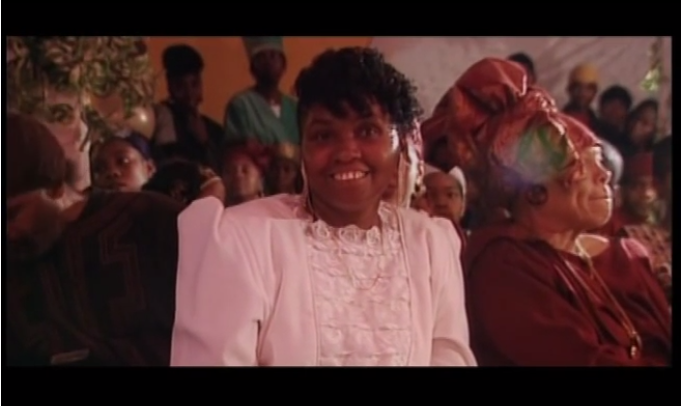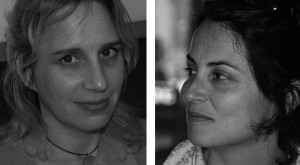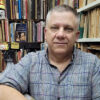Earlier this month, I wrote in Haaretz about a new documentary on the African Hebrew Israelites. In reporting the story, I spoke with the Israeli directors of “Sister-Wife,” the first full-length documentary on the community. I wasn’t able to use much of the interview in my article, but I believe the story of how they came to make their film is worth sharing.
Hadar Kleinman-Zadok and Timna Goldstein-Hattab were film students at Tel Aviv University in 1997 when, on the advice of their professor, Shimon Kagan, they went to Dimona in search of an “exotic” subject for their final project. At the time, the Hebrews were still considered a shadowy cult, closed off from the rest of Israeli society, maybe even violent. Kleinman-Zadok and Goldstein-Hattab were initially rebuffed by the leaders of the community, who said that filming inside the Village of Peace would not be possible. But the women were persistent, visiting the village many times and befriending the community’s Minister of Information (who, they said, carried himself like he was Elijah the Prophet.) They began filming only after a year of conversations with the leaders. “During that year, we worked to build trust with the community, which ultimately was integral to the project,” Kleinman-Zadok said.
The filmmakers said they were immediately struck by the “dissonance” between the strong, proud Hebrew women they met in Dimona and their seemingly passive acceptance of polygamy. (The Hebrews assert that polygamy is both Biblically sanctioned and traditionally African, and men are permitted to take up to seven wives. Polygamy is technically illegal in Israel, though some Bedouins continue to practice it as well.) Kleinman-Zadok said that she and Goldstein-Hattab wanted to show how polygamy worked in the community but fretted that the leaders would not approve. To their surprise, the Hebrews’ spiritual leader, Ben Ammi Ben Israel, eventually granted permission and chose a family for them to film. “The feeling was that they trusted us, and that they wanted to talk about themselves and open up to Israeli society, to lift the veil and remove the stigmas that had been affixed to them over the years,” Kleinman-Zadok said.
“Sister-Wife” revolves around Atur (Crowned Brother) Khazriel, Tziporah, his wife of 21 years and the mother of his nine children, and Arellah, who is to become Khazriel’s second wife and is 14 years Tziporah’s junior. It was shown at film festivals in Israel and around the world, and was broadcast on Israeli television. Viewers praised the film for its sensitivity. It was also well-received in the community. “We thought that they would criticize us because the film is from the women’s point of view, and perhaps it exposes too much, or it shows that the women don’t have equal rights,” Goldstein-Hattab said. “But the interesting thing was that they loved it, the men and the women.”
You can read my full interview with Kleinman-Zadok and Goldstein-Hattab below.
What inspired you to make a film about the African Hebrew Israelites?
Hadar Kleinman-Zadok: Timna had a musician friend who knew a number of musicians from the Village of Peace. He told her about the community, and it sounded really interesting. We knew almost nothing about them. We knew that they came from America, that they were musicians, that they were vegans, and that was just about all the information we had. We decided to go to Dimona and try to understand who they are and what their story is. We didn’t have any expectations. We just wanted to complete our final project for the Tel Aviv University film department.
Timna Goldstein-Hattab: We had a great teacher at Tel Aviv University, Professor Shimon Kagan, who said, ‘Enough with films about the Arabs and the conflict with the Palestinians. Try and be more courageous.’ But a lot of other teachers said, ‘But why do you want to make a film about the cushim [a derogatory Hebrew word for black people]?’ They said terrible things about this community, that it’s violent. We were like, ‘No they’re not. You’ve got to get to know them. They have a lot of virtues.’ There’s always prejudice, and you’ve got to be intelligent and not be prejudiced. This is also something that led us to not criticize them [in the film]. It wasn’t the right starting point to judge them. In the end the film raises questions, but everything raises questions.
How were you received by the community during the filmmaking process?
HKZ: When we arrived at the village for the first time [in late 1997], lots of children gathered around us and asked a million questions. It was strange. They spoke in English with Hebrew words sprinkled here and there. The adults were pleasant, but each one directed us to the Aturim [Crowned Brothers, part of the community’s leadership hierarchy] and Aturot [Crowned Sisters]. We looked for a specific Aturah [Aturah Yafah, a community spokesperson] to whom we were referred. She was very assertive and said that there was no chance we would be able to film the community, but that if we wished to come and visit again, we were always welcome. It seemed hopeless.
In the late 90s, the community did not have any legal status whatsoever. They were closed off and had been hurt by negative media attention over the years. Regardless, we visited a few more times. In the end we were sent to Sar Elyashuv, an amazing man who looks like Elijah the Prophet. We realized later that he was the Minister of Information for the community. We would go to his office to talk about once a week. We also met with other ministers, Aturim, and Aturot and had fascinating conversations with them. During that year, we worked to build trust with the community, which ultimately was integral to the project.
It’s important to note that back then communication with the community was complicated. There were no cell phones. There was a single pay phone in the village that we would call to leave messages to try to set up meetings. Sar Elyashuv didn’t promise us anything. He said he needed permission from Ben Ammi Carter [who now goes by Ben Ammi Ben Israel], their spiritual leader. After a few months of close contact, Sar Elyashuv formally notified us that we had received permission from Ben Ammi Carter. We felt like we had won.
How did you choose the subject for the film, and what was your approach to telling the story?
HKZ: The connection with the community was one of the most fascinating parts of the experience of making the film. We met intelligent, funny, warm people who were looking for their place in Israeli society. But we were in for an even greater surprise when we met the women of the community—strong, smart, assertive women who spoke to us openly about polygamy.
Even though we were two young women, Tel Avivis for whom polygamy was unimaginable, the dissonance of these assertive women in polygamous relationships fascinated us. We really wanted to understand, without judgment, how it was possible to adopt this lifestyle. It was a time (at least in Israel) when alternative models of families were being embraced. And, in truth, despite our personal objections to the lifestyle we wanted to see how it worked. We wanted to record the real process, as it was happening, not just hear stories about families like this in retrospect.
TGH: Our approach was to tell a human story about a community that practices polygamy. We followed them for a few years, using a very intimate fly-on-the-wall approach. It was very important to us to let them tell their story, and it was the thing that made the film so successful. It was like a feature film. Many people who saw it asked us if it was really a true story because the situations seemed scripted.
How did the leaders react when you told them you wanted to focus on polygamy?
HKZ: We debated how to tell Sar Elyashuv that this was the subject that we found most engaging. We thought it would close the door on our project. But once again, we were pleasantly surprised. We revealed our desire to understand and track this process, and the approval came pretty quickly. The feeling was that they trusted us, and that they wanted to talk about themselves and open up to Israeli society, to lift the veil and remove the stigmas that had been affixed to them over the years. The community chose the family for us. They really believed in them, in Khazriel, the husband, Tsiporah, the first wife, and Arella, the second wife.
Where did the film show, and how was it received?
TGH: It was shown on Channel 2 in Israel and by foreign broadcasters in Russia, France, Germany and the States. It played at a number of film festivals: the Chicago Human Rights Film Festival, where it won a merit, the Toronto Film Festival, the International Documentary Film Festival Amsterdam, the Biarritz Film Festival, and others.
The film raised a lot of questions. It always sparked a lively discussion afterwards about how the women let these things happen to them, and how come a lot of the feelings and conflicts that the women experienced were shown but weren’t said. The first wife [Tsiporah] never said, ‘I don’t agree with [polygamy], it’s difficult for me.’ It was more the look on her face that showed her pain.
And what did the Hebrews themselves think about the film?
TGH: We were most surprised by the community’s reaction. We thought that they would criticize us because the film is from the women’s point of view, and perhaps it exposes too much, or it shows that the women don’t have equal rights. But the interesting thing was that they loved it, the men and the women.
We were really scared when we went to show it to the community leaders to confirm that it was okay to release. We were panicking; I took my husband with me to the screening. It was late at night because they said that was the best time to do it, when they weren’t working and the most important leaders could come. There were about five of them watching the rough cut. Sar Elyashuv was there. From the beginning they were laughing at certain parts and crying at other parts. Afterward, they stood up and hugged us and said, ‘You told our story very well, not like some foreigners just came in and made a film about us.”
What impact did the film have in Israel?
TGH: It was definitely a breakthrough in documentary filmmaking in Israel. It was one of the first feature documentaries done here. Now Israel is known for its feature documentaries on different subjects, but at that time it wasn’t very popular.
I think it also broke taboos by showing that they’re not a cult. It shows the problems associated with polygamy, but also that they are human beings, that they sing beautifully, that they are nice people. It was good publicity for them.
When we made the film, they didn’t have citizenship and they didn’t go to the army, but they really wanted to have citizenship and they wanted to go to the army. We sent this film out to some government ministers. It was shown at the Jerusalem Film Festival and it made a lot of noise, and I think a few years after that they got residency. [Ed. Most community members received permanent residency in 2003.] I think the film had some impact, maybe not directly, but it did something good for them.
Were you aware that Tziporah divorced Khazriel a few years ago and is now one of the most outspoken critics of the community? What do you make of that?
HKZ: Yes, we’re in touch with Tsiporah. She lives in Tel Aviv. We are full of respect for Tsiporah and think she is a very courageous, strong woman. Not just because she got up and left a place that few people leave, but also because she felt oppressed as a woman so she decided to go somewhere else, knowing she would never be able to return to Dimona. Back then, we were young and optimistic. Today, we are grown women with children and see things a little differently. Patriarchy exists not just in closed communities. We too experience it in 2014 in many different aspects of life, including in the workplace. One doesn’t need to live in a closed community to understand this.
TGH: I think the film gave her a lot of perspective. It took some years, but it made her go through some kind of change. The Bedouins practice polygamy, and she told us that a lot of Bedouin women came up to her and said, ‘We live in a community with polygamy and it’s difficult.’ It strengthened her in a way. I’m sure it gave her a push to change things in later years. [Ed. Tsiporah, who now goes by her birth name Belinda, explains in a YouTube interview that she began to question her acceptance of divine marriage, and of the AHIJ doctrine as a whole, after an Israeli professor referred to her at a screening of the film as a “pitiful” person. “At that moment, I understood that I’m being pitied here, and it resonated with me because I actually felt pitiful,” she said.]
On a personal level, how did making the film impact you?
TGH: It was definitely a life experience for us. Even talking about it now with you, I told a friend of mine, this film was so meaningful it still has a life after 10 years.
This interview was conducted by phone and e-mail and has been edited for continuity.





